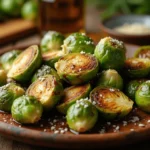Table of Contents
Brussels sprouts are a nutritional powerhouse, packed with fiber, vitamins, and antioxidants. Whether you enjoy them roasted, sautéed, or added to salads, they offer numerous health benefits. Many vegetarians turn to Brussels sprouts as a protein-rich vegetable, making them a staple in plant-based diets. Learn more about incorporating them into a vegetarian lifestyle.
Athletes can also benefit from Brussels sprouts as a nutrient-dense ingredient in meal prep. These tiny cabbages can be included in meal prep recipes for athletes to enhance performance and recovery.
What Are Brussels Sprouts?
Brussels sprouts (Brassica oleracea var. gemmifera) belong to the cruciferous vegetable family, related to cabbage and kale. They grow on thick stalks and are harvested primarily in the fall and winter seasons.
- Origin: Cultivated in Belgium since the 16th century.
- Flavor Profile: Slightly bitter when raw, but turns sweet and nutty when roasted.
- Nutritional Highlights: High in fiber, vitamin C, and vitamin K.
Health Benefits of Brussels Sprouts
Brussels sprouts are among the most nutrient-dense vegetables, offering multiple health benefits:
- Supports Digestive Health: High fiber content aids digestion and promotes gut health.
- Boosts Immunity: Rich in vitamin C, which helps strengthen the immune system.
- Anti-Inflammatory Effects: Contains kaempferol, a compound that reduces inflammation.
- Aids in Muscle Recovery: Essential for athletes looking to enhance performance.
For a well-balanced diet, Brussels sprouts can be added to dishes like a power salad. Pair them with healthy fats, such as avocado, in this nutritious avocado salad.
How to Cook Brussels Sprouts
Brussels sprouts can be prepared in several ways to maximize their flavor and nutritional benefits.

1. Roasting (Most Popular Method)
- Cut sprouts in half and toss with olive oil, salt, and pepper.
- Roast at 425°F (218°C) for 20-25 minutes until golden brown.
- Enhance with balsamic glaze or Parmesan cheese.
2. Sautéing for Quick Preparation
- Heat a pan with butter or olive oil over medium heat.
- Add sliced Brussels sprouts and cook for 7-10 minutes.
- Finish with garlic, lemon juice, or chili flakes for added flavor.
3. Adding to Soups and Stews
Brussels sprouts can be a great addition to hearty vegetable soups. For example, you can toss them into this One-Pot Lentil Vegetable Soup for a nutrient boost.
How to Grow Brussels Sprouts at Home
Growing Brussels sprouts requires patience, but they thrive in cooler temperatures.
- Best Planting Season: Spring and fall.
- Sunlight Requirement: At least 6-8 hours per day.
- Soil Type: Well-draining, nutrient-rich soil.
- Harvest Time: Takes about 90-120 days to mature.
Conclusion
Brussels sprouts are a superfood that fits into various diets, from vegetarian meals to athlete-focused meal preps. They are easy to cook, full of essential nutrients, and even simple to grow at home. Whether you’re looking to add more fiber and vitamins to your diet or create delicious roasted side dishes, Brussels sprouts are an excellent choice.
FAQ
Are Brussels sprouts good for you?
Yes! Brussels sprouts are rich in fiber, vitamins C and K, and antioxidants. They support heart health, digestion, and help reduce inflammation.
Why do some people dislike Brussels sprouts?
Brussels sprouts contain glucosinolates, which can give them a bitter taste. Roasting or sautéing them with olive oil, garlic, or balsamic vinegar helps balance the flavor.
Can you eat Brussels sprouts raw?
Yes! You can eat raw Brussels sprouts in salads or slaws. Shredding them finely and mixing with lemon juice or vinaigrette softens their texture and taste.
How do you make Brussels sprouts crispy?
To get crispy Brussels sprouts, roast them at 425°F (218°C) with oil and spread them in a single layer on a baking sheet. Air frying is another great option.
What is the best way to store Brussels sprouts?
Keep fresh Brussels sprouts in the refrigerator in a perforated plastic bag. For long-term storage, blanch and freeze them to retain their texture and nutrients.
Print
Brussels Sprout: 10 Easy Recipes for a Healthy Meal
- Total Time: 35min
- Yield: 4 servings 1x
- Diet: Vegetarian
Description
These crispy roasted Brussels sprouts are packed with flavor, caramelized to perfection, and lightly seasoned for a delicious side dish. A touch of balsamic glaze and Parmesan cheese adds richness, making this recipe a family favorite!
Ingredients
- 1 lb Brussels sprouts, trimmed and halved
- 2 tbsp olive oil
- 1 tsp salt
- ½ tsp black pepper
- 1 tbsp balsamic vinegar (optional, for extra flavor)
- 2 cloves garlic, minced (optional, for aroma)
- ¼ cup grated Parmesan cheese (optional, for a cheesy touch)
- ½ tsp red pepper flakes (optional, for a spicy kick)
Instructions
- Preheat the oven to 425°F (218°C). Line a baking sheet with parchment paper.
- Prepare the Brussels sprouts by trimming the ends and cutting them in half.
- Toss the sprouts in a large bowl with olive oil, salt, black pepper, and minced garlic.
- Spread them out evenly on the baking sheet, cut side down for extra crispiness.
- Roast for 20-25 minutes, stirring halfway through, until golden brown and crispy.
- Drizzle with balsamic vinegar and sprinkle Parmesan cheese before serving. Enjoy!
- Prep Time: 10 min
- Cook Time: 25min
- Category: Side Dish
- Method: Roasting
- Cuisine: American

